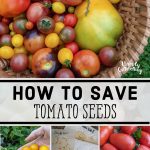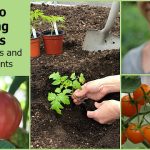Hybrid tomatoes are generally considered better than heirloom tomatoes. Hybrid tomatoes are a crossbreed of different tomato varieties, resulting in plants with desirable traits like disease resistance and higher fruit yield.
On the other hand, heirloom tomatoes are open-pollinated and have been passed down for generations, known for their unique flavors and appearances. However, hybrid tomatoes are preferred by many growers due to their commercial viability and consistent performance, while heirlooms are favored by those who value diversity and taste.
The debate between hybrid and heirloom tomatoes continues among gardeners and food enthusiasts, with each variety having its own merits and appeal. Ultimately, the choice between hybrid and heirloom tomatoes depends on personal preferences, culinary needs, and growing conditions.

Credit: www.timeout.com
What Are Hybrid Tomatoes?
Hybrid tomatoes are a crossbreed of different tomato varieties, resulting in plants that offer improved disease resistance, higher yields, and longer shelf life. When comparing hybrid and heirloom tomatoes, it boils down to personal preference – hybrid tomatoes might be better for commercial production, while heirlooms are cherished for their unique flavor and history.
Ultimately, the choice between the two depends on your specific needs and tastes.
Definition And Characteristics Of Hybrid Tomatoes
Hybrid tomatoes are a result of crossbreeding between two or more different tomato varieties. This deliberate cross-pollination is done to incorporate the most desirable traits of each parent plant into the hybrid offspring. These traits can include improved yield, disease resistance, better color, and longer shelf life.
Characterized by their uniform size, shape, and color, hybrid tomatoes are specifically bred to meet the demands of modern agriculture and consumer preferences. They are often labeled with catchy names and have consistent appearances, making them easily identifiable in the marketplace.
Advantages Of Hybrid Tomatoes In Terms Of Yield And Disease Resistance
Hybrid tomatoes have gained popularity among farmers and gardeners due to their numerous advantages in terms of yield and disease resistance. The intentional crossbreeding of different parent varieties enables these hybrids to combine the best traits from each, resulting in enhanced productivity.
One of the key advantages of hybrid tomatoes is their improved yield. Hybrid varieties are known to produce larger and more abundant fruit compared to heirlooms. This increased yield is achieved through careful selection and breeding techniques that emphasize high productivity.
Moreover, hybrid tomatoes are bred for their disease resistance. They are specifically engineered to resist common tomato diseases such as blight, wilt, and viruses. This resistance allows growers to minimize the use of chemical pesticides and fungicides, promoting more sustainable and eco-friendly cultivation practices.
Common Varieties Of Hybrid Tomatoes
| Variety Name | Growing Season | Characteristics |
|---|---|---|
| Sun Gold | Mid to Late Season | An orange cherry tomato with exceptional sweetness and intense flavor. |
| Beefsteak | Mid to Late Season | A large, meaty tomato ideal for slicing, grilling, or sandwiches. |
| Roma | Mid to Late Season | Popular for sauces and canning, this variety is meaty and has low moisture content. |
| Celebrity | Early to Mid-Season | A well-rounded tomato with good disease resistance and flavor. |
These are just a few examples of the common hybrid tomato varieties available. Each offers unique characteristics and is bred to meet specific taste preferences and growing conditions.
What Are Heirloom Tomatoes?
Heirloom tomatoes are open-pollinated varieties that have been passed down through generations, prized for their unique flavors and characteristics. Unlike hybrids, heirlooms offer a wide range of colors, shapes, and sizes, making them a favored choice for gardeners and food enthusiasts alike.
Definition And Characteristics Of Heirloom Tomatoes
Heirloom tomatoes are a unique and treasured variety of tomatoes that have been passed down through generations. Unlike hybrid tomatoes that are bred for specific traits, heirloom tomatoes are open-pollinated, meaning they are naturally pollinated by insects, birds, or wind, allowing for natural genetic variations.
Heirloom tomatoes are known for their distinctive flavors, vibrant colors, and diverse shapes, making them a favorite choice among avid gardeners and food enthusiasts. The term “heirloom” refers to the age of the variety, typically dating back at least 50 years, and often carries a sense of nostalgia and tradition.
Advantages Of Heirloom Tomatoes In Terms Of Flavor And Diversity
One of the major advantages of heirloom tomatoes is their exceptional flavor. Unlike hybrid tomatoes that are often bred for long shelf life and uniform appearance, heirlooms prioritize taste. Each variety of heirloom tomato has its own unique flavor profile, ranging from sweet and tangy to rich and earthy. These distinct flavors can add depth and complexity to a variety of dishes.
Along with their superior flavor, heirloom tomatoes also offer a remarkable diversity. There are thousands of heirloom tomato varieties available, each with its own set of characteristics. From small cherry tomatoes to large beefsteak tomatoes, heirlooms come in a stunning array of sizes, colors, and shapes. This diversity not only adds visual interest to dishes but also allows for a range of textures and tastes.
Common Varieties Of Heirloom Tomatoes
When it comes to heirloom tomatoes, there is no shortage of options to choose from. Here are some of the most popular and widely recognized varieties:
| Variety | Characteristics |
|---|---|
| Brandywine | A robust and meaty tomato with a rich, sweet flavor. Comes in pink and red variants. |
| Cherokee Purple | A visually striking tomato with a deep purple skin and a sweet, smoky flavor. |
| Green Zebra | A small, tangy tomato with vibrant green stripes and a slightly tart flavor. |
| Roma | An excellent tomato for sauces and canning, known for its meaty texture and low water content. |
These are just a few examples of the wide range of heirloom tomato varieties available. Choosing from different varieties allows you to explore different flavors, textures, and colors, elevating your culinary creations.
Key Differences Between Hybrid And Heirloom Tomatoes
When it comes to tomatoes, there are two main varieties that dominate the market – hybrid tomatoes and heirloom tomatoes. Both have their own unique characteristics and traits, making them suitable for different preferences and purposes. In this article, we will explore the key differences between hybrid and heirloom tomatoes to help you make an informed choice.
Differences In Growth And Cultivation Methods
Growing and cultivating hybrid tomatoes and heirloom tomatoes require different approaches. Hybrid tomatoes are created by crossbreeding different tomato varieties with desirable traits. This process is carefully controlled to produce tomatoes that exhibit specific characteristics, such as disease resistance or uniformity in size and shape.
On the other hand, heirloom tomatoes are open-pollinated varieties that have been passed down through generations. They are known for their genetic diversity and are often preferred by organic gardeners and enthusiasts who appreciate the historical significance of these varieties.
In order to cultivate hybrid tomatoes, farmers often rely on agrochemicals and precise growing conditions to maximize their potential. Heirloom tomatoes, on the other hand, are more adaptable to different growing conditions, making them suitable for organic and sustainable farming practices.
Differences In Taste, Appearance, And Texture
When it comes to taste, appearance, and texture, hybrid and heirloom tomatoes offer unique experiences. Hybrid tomatoes are often bred for specific qualities, such as improved disease resistance or uniform appearance. As a result, they may lack the complex flavors and nuances found in heirloom tomatoes.
Heirloom tomatoes, on the other hand, are known for their distinctive flavors and vibrant colors. They come in a wide range of shapes, sizes, and colors, offering a visually appealing and diverse selection. The taste of heirloom tomatoes can vary from sweet and tangy to rich and savory, allowing for a more diverse culinary experience.
While hybrid tomatoes may have the advantage of consistency in appearance and texture, heirloom tomatoes provide a more authentic and diverse taste profile that appeals to tomato enthusiasts and lovers of unique flavors.
Differences In Disease Resistance And Adaptability
One of the key factors that differentiate hybrid and heirloom tomatoes is their disease resistance and adaptability. Hybrid tomatoes, with their carefully selected genetic traits, are often bred to be resistant to common tomato diseases, such as blight or fusarium wilt. This can make them easier to grow and less prone to diseases under optimal conditions.
Heirloom tomatoes, however, may not possess the same level of disease resistance as hybrids. They have not undergone extensive breeding for disease resistance, which means they may require more care and attention to prevent and manage diseases.
On the flip side, heirloom tomatoes are known for their adaptability. They have evolved over time to thrive in diverse climates and conditions, making them a suitable choice for home gardeners and farmers who prefer natural methods of pest and disease control.
| Hybrid Tomatoes | Heirloom Tomatoes |
|---|---|
| Bred for specific traits such as disease resistance | Open-pollinated and genetically diverse |
| Uniform appearance and texture | Wide range of shapes, sizes, and colors |
| Require agrochemicals and precise growing conditions | More adaptable to different growing conditions |
| Often resistant to common tomato diseases | May require more care and attention to disease prevention |
In conclusion, the choice between hybrid and heirloom tomatoes ultimately depends on individual preferences and practical considerations. Hybrid tomatoes offer uniformity, disease resistance, and controlled traits, while heirloom tomatoes provide diverse flavors, vibrant appearances, and the charm of historical genetics. Whether you prioritize consistency or complexity, both varieties have their own merits in the world of tomatoes.
Factors To Consider When Choosing Between Hybrid And Heirloom Tomatoes
Are you considering growing tomatoes in your garden? With so many varieties available, it’s important to understand the factors that can help you make an informed choice between hybrid and heirloom tomatoes. Each type has its own unique characteristics that can impact your gardening experience and the quality of the tomatoes you harvest. In this article, we will explore the key considerations based on taste preferences, specific growing conditions, disease resistance, and ease of cultivation.
Considerations Based On Taste Preferences
When it comes to choosing between hybrid and heirloom tomatoes, taste is an important factor to consider. Heirloom tomatoes are known for their exceptional flavor and diverse range of unique taste profiles. These tomatoes come from open-pollinated seeds and have been passed down through generations, resulting in a rich flavor that many gardeners and food enthusiasts appreciate.
On the other hand, hybrid tomatoes are often bred for specific traits such as disease resistance or longer shelf life, which can sometimes come at the expense of flavor. However, advancements in breeding techniques have allowed for the development of hybrid varieties that offer a balance between flavor and other desirable characteristics. Some gardeners may prefer the consistent taste of hybrid tomatoes or value the convenience they bring.
Considerations Based On Specific Growing Conditions
The specific growing conditions in your garden can influence your choice between hybrid and heirloom tomatoes. Heirloom tomatoes are often better adapted to local climates and have the advantage of being acclimated to specific growing conditions over time. These tomatoes may be more tolerant of variations in temperature, humidity, and soil conditions in your area.
On the other hand, hybrid tomatoes are often bred to possess certain traits that can help them thrive in challenging environments. For example, if you live in an area with a shorter growing season or limited sunlight, there may be hybrid varieties available that are specifically bred to tolerate such conditions. It’s important to assess your specific growing conditions and choose a tomato variety that is well-suited to your garden’s unique environment.
Considerations Based On Disease Resistance And Ease Of Cultivation
Another important factor to consider when choosing between hybrid and heirloom tomatoes is disease resistance and ease of cultivation. Hybrid tomatoes are often bred for disease resistance, which means they are less likely to be affected by common tomato diseases such as blight or wilt. This can be particularly advantageous for gardeners who may not have the time or resources to devote to extensive disease management.
Heirloom tomatoes, on the other hand, may lack the same level of disease resistance as their hybrid counterparts. However, they can still be successfully grown with proper care and attention. Many gardeners enjoy the challenge of growing heirlooms and find the rewards of their efforts in the unique flavors and textures these tomatoes offer.
| Considerations | Hybrid Tomatoes | Heirloom Tomatoes |
|---|---|---|
| Taste | May prioritize other traits over flavor | Known for exceptional flavor and diverse profiles |
| Specific Growing Conditions | Bred for adaptability to various environments | Better adapted to local climates over time |
| Disease Resistance | Bred for enhanced disease resistance | May have lower disease resistance |
| Ease of Cultivation | Often easier to grow due to disease resistance | May require more care and attention |
Ultimately, the choice between hybrid and heirloom tomatoes depends on your personal preferences, growing conditions, and desired level of involvement in tomato cultivation. Both types of tomatoes offer distinct advantages and can be rewarding to grow in their own way. By considering taste preferences, specific growing conditions, disease resistance, and ease of cultivation, you can make an informed decision that best suits your gardening needs.
Frequently Asked Questions For Hybrid Vs Heirloom Tomatoes – Which Is Better
What Is The Difference Between Hybrid And Heirloom Tomatoes?
Hybrid tomatoes are bred by crossing two different varieties to create plants with specific traits, while heirloom tomatoes are open-pollinated, meaning they are pollinated by natural means. Hybrid tomatoes offer consistent traits and disease resistance, while heirloom tomatoes are known for their unique flavors and characteristics.
Are Hybrid Tomatoes Genetically Modified?
No, hybrid tomatoes are not genetically modified. They are created through traditional breeding methods, using natural cross-pollination. Genetic modification involves introducing foreign genes into a plant’s DNA, which is not the case with hybrid tomatoes.
Do Hybrid Tomatoes Taste Different From Heirloom Tomatoes?
Yes, hybrid and heirloom tomatoes have different taste profiles. Hybrid tomatoes are often bred for traits like uniformity and disease resistance, which can affect their flavor. Heirloom tomatoes, on the other hand, are known for their diverse and unique flavors, ranging from sweet to tangy.
Which Type Of Tomato Is Better For Home Gardening?
Both hybrid and heirloom tomatoes can be great choices for home gardening, depending on your preferences. Hybrid tomatoes offer consistent yields and disease resistance, making them easier to grow. Heirloom tomatoes, although more challenging to grow, provide unique flavors and the satisfaction of preserving traditional plant varieties.
Conclusion
Both hybrid and heirloom tomatoes have their own unique characteristics and benefits. Hybrids are known for their disease resistance, abundant yield, and uniformity, making them a practical choice for commercial growers. On the other hand, heirloom tomatoes offer unmatched flavor, diversity, and the opportunity to save and share seeds.
Ultimately, the choice between hybrids and heirlooms depends on personal preferences, gardening goals, and the specific needs of each individual or business. Whether you prioritize convenience or taste, experimenting with both types can lead to a fruitful and enjoyable tomato-growing experience.

I am a graduate of Bangladesh Agricultural University, where I delved into various agricultural disciplines, equipping me with a profound understanding of agriculture. Beyond academics, I have hands-on experience in gardening and crop cultivation. My passion is to embrace sustainable farming and horticulture. With a BSc in Agriculture, I am dedicated to promoting environmentally conscious and efficient agrarian practices.
Bachelor of Science (BSc) in Agriculture (Hons.)
Master of Science. (Sustainable Agriculture & Food Security ) (MS)
Bangladesh Agricultural University



